“Tonight I have mixed emotions. I’m thankful that the victims from tonight’s shootings are not suffering from life-threatening injuries and that no additional bystanders were hurt. However, I’m angry that gun violence continues to shatter lives in all parts of our city, whether it be on the Plaza or at 44th and Montgall, where I grew up. We must send a message to those individuals whose use of guns diminishes the safety of all of our neighborhoods. Let’s bring this person to justice quickly by calling the tips hotline,816-474-TIPS, if you have any information that could help.”


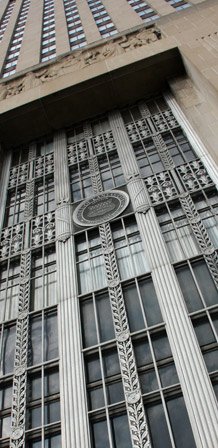
A Stately Edifice
In 1931 by a 4-1 margin, Kansas City voters passed the “Ten-Year Plan” which built City Hall. The 30 story building is considered to have neo-classic or beaux arts architecture, but is most notable for its art deco details and ornamentation.
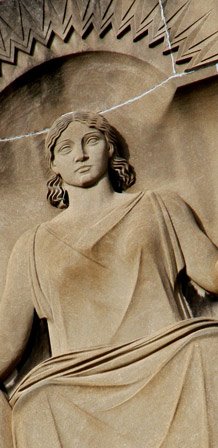
Crowned in Light
Above the south door of City Hall sits Kansas City portrayed as a woman crowned in light. She holds the key to the city and is surrounded by wheat and cattle. Flanking her are representations of education, law, faith and public service. She was sculpted by C. P. Jennewein.

Protecting Against Evil Spirits
Guarding south entrance to City Hall are two stone lions, Bicentennial gifts to Kansas City by the Republic of China (Taiwan). They were dedicated in 1976 and are said to ward off evil spirits and bad fortune.
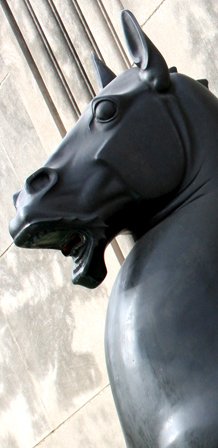
Meet “Lugs” and “Cuts”
Two sea horses nicknamed “Lugs” and “Cuts” stand on the south lawn of City Hall. They were named by city employees in the 1930’s for the “Lugs” of the political machine and “Cuts” to wages during the Great Depression.
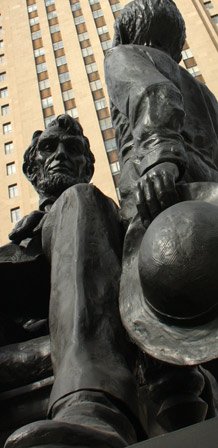
Father and Son
On the south plaza of City Hall sits a statue of President Abraham Lincoln reading to his youngest son, Tad. The sculpture was a gift from businessman Orville Anderson and was sculpted by Lorenzo Ghiglieri of Oregon.

Craftsmanship on Display
Flanking the north entrance of City Hall are two art deco lanterns. City Hall cost $6 million to construct, a third of which was from President Roosevelt’s Works Progress Administration. The “New Deal” program put unemployed laborers, craftsman and artists to work.
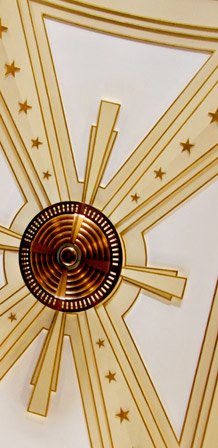
The Greatness of a City
The ceiling of the lobby of City Hall features a starburst supporting a chandelier. Engraved on the wall is the reminder, “The greatness of a city depends not alone upon great boundaries or multitude of inhabitants by upon the probity and industry of its citizens”.

A Single Giant Tree
This ornamented clock is in the Council Chamber on the 26th floor. All 150 21-foot tall panels lining the chamber came from a single tree — a massive oak from upstate New York. With no veneer presses large enough, the panels had to be cut and worked by hand.
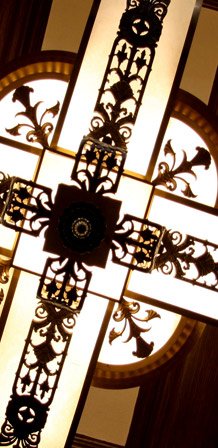
Let There be Light
Hanging in the Council Chamber, this giant chandelier is typical of the craftsmanship found throughout City Hall. Carved in the oak panels behind the Mayor’s podium is a wish for future generations that “honor, truth and justice rule within these walls”.
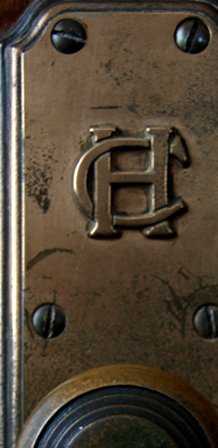
An Open Door
Reflective of the details found throughout the building, nearly every single door are embossed with an intertwined “CH” for “City Hall”. The building required 6,300 tons of steel, enough concrete to fill 400 freight cars and enough lumber to fill 20 more.
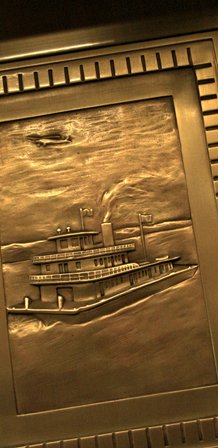
Cross the Wide Missouri
The elevator doors in City Hall are bronze and their panels feature four modes of transportation in relief: riverboat, car, train and airplane. The top of City Hall was the highest point n Missouri when completed and still is the world’s 4th tallest City Hall.
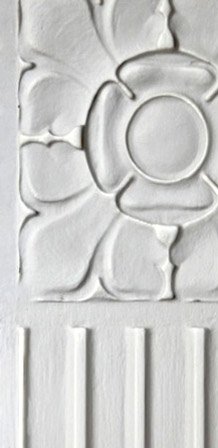
Beauty in the Details
Referencing the Dogwood, state tree of Missouri, this flower detail is a testament to architects Wright and Wright. The flower can be found on the floor of the lobby in brass, in the ceilings of each floor in plaster, and even on the Mayor’s desk in wood.

